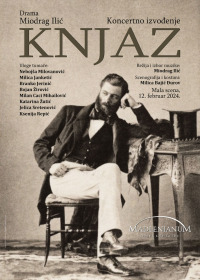Miodrag Ilic
KNYAZ
Book & Buy TicketsMonday, 12 February at 20:00 h
Small Stage of Madlenianum
At the conclusion of marking the 200th anniversary of the birth of one of the most distinguished Serbian rulers in recent history – Knyaz Mihailo Obrenović III – the Opera & Theatre Madlenianum will present a new dramatic work Knyaz by Miodrag Ilic, on 12th February at 20:00h on the Small Stage. The work will be performed in a concert format, with scenography and costumes by Milica Bajic Djurov, video by Zvonko Jelusic, sound design by Dusan Arsikin, and lighting design by Srdjan Jovanovic. In this concert performance, the roles will be portrayed by: Nebojsa Milovanovic (Knyaz Mihailo), Milica Janketic (Knyaginya Julija), Branko Jerinic (Milos Obrenovic), Bojan Zirovic (Anastas Jovanovic), Milan Caci Mihailovic (Dr. Karl Pacek, the doctor), Katarina Zutic (Anka Konstantinovic), Jelica Sretenovic (Tomanija Obrenovic) and Ksenija Repic (Katarina). This drama is among the seven selected dramas about Knyaz Mihailo in the book Knyaz Mihailo – The Balkans Hamlet, edited by Radomir Putnik and published by Zepter Book World.
Knyaz Mihailo, the "Knez" – as is well-known – ended his life in an assassination on 10th June, 1868, under circumstances never fully clarified, while walking in Košutnjak with his late chosen love one, much younger close relative Katarina, accompanied by Katarina's mother and grandmother, his first cousin Anka Konstantinovic, or aunt Tomanija, the widow of Jevrem Obrenovic. Ilić in his drama does not shy away from this bloody event in the finale, but predominantly focuses on the causes and all the ominous events that led to the tragedy. In Europe, Knyaz Mihailo was referred to as the "The Balkans Hamlet," probably because he was a poetic nature, an enlightened absolutist who did not reconcile with Serbia's backwardness, but he, instead, engaged in a risky struggle with conservative circles and limited political minds, establishing a modern social system based on the constitution and laws. Just as Hamlet poses the eternal question "to be or not to be," that is, to accept a bitter fate or to rise, fight, and even lay down one's life, the Serbian Knyaz chooses the struggle, he establishes national institutions, works towards the final liberation of the country from centuries of Turkish occupation, confronts enemies both within Serbia and on the international stage. His Promethean sacrifice, his faith and enthusiasm are the fundamental motifs of the drama.
However, Knyaz Mihailo is torn apart by the belated realization that his beloved wife, Knyaginya Julija (from the Hungarian aristocratic Hunyadi family), has been cheating on him for years with the powerful German Duke Arenberg, spending passionate days and nights together during "sterility treatments" in European spas or during her diplomatic missions entrusted to her by her husband. Julija is emotionally torn between two men, too weak to resist the erotic challenges offered by her lover. Her relationship with Mihailo, dramatic conflicts, painful encounters and separations give this work a melodramatic component, revealing a parallel Hamletism of the Knyaz in his private life. His suffering, after the definitive breakup, finds relief in an incestuous relationship with a young relative, which will result in general condemnation, even the threat of excommunication from the Orthodox Church, government resignation... The Knyaz refusal to pardon a criminal will lead the brothers of the prisoners to raise their hand against their Knyaz (perhaps assisted by some outside the country factors) and assassinate the one who has accomplished great deeds for his people.
"Concert performance" is not merely the reading of a dramatic work but an intermediate step between reading and a fully staged theatrical production. Actors, dressed in the style of the second half of the nineteenth century, with symbolically suggested scenography, aided by lighting and sound effects, music, and video projections, will attempt to use reading to suggest the emotional intensity of the characters they portray, to make the story dynamic and engaging.

